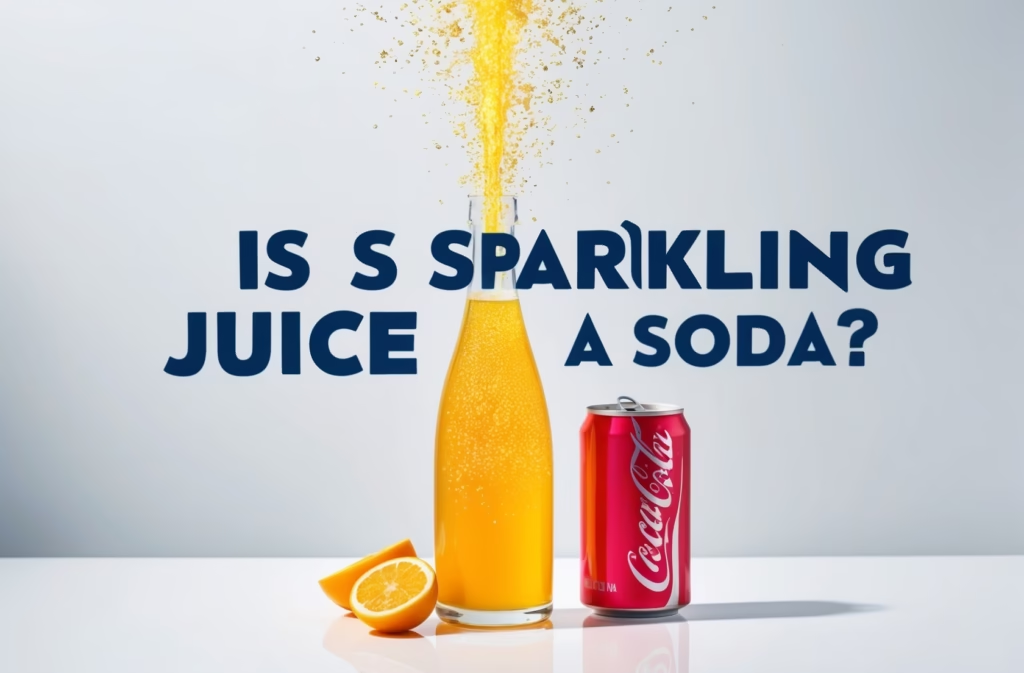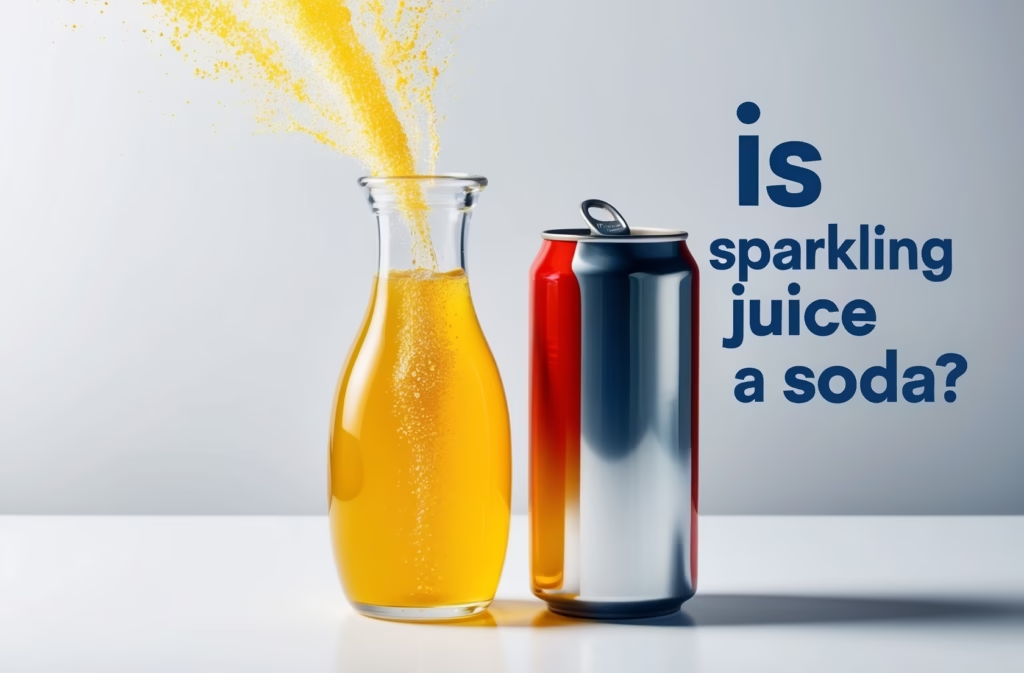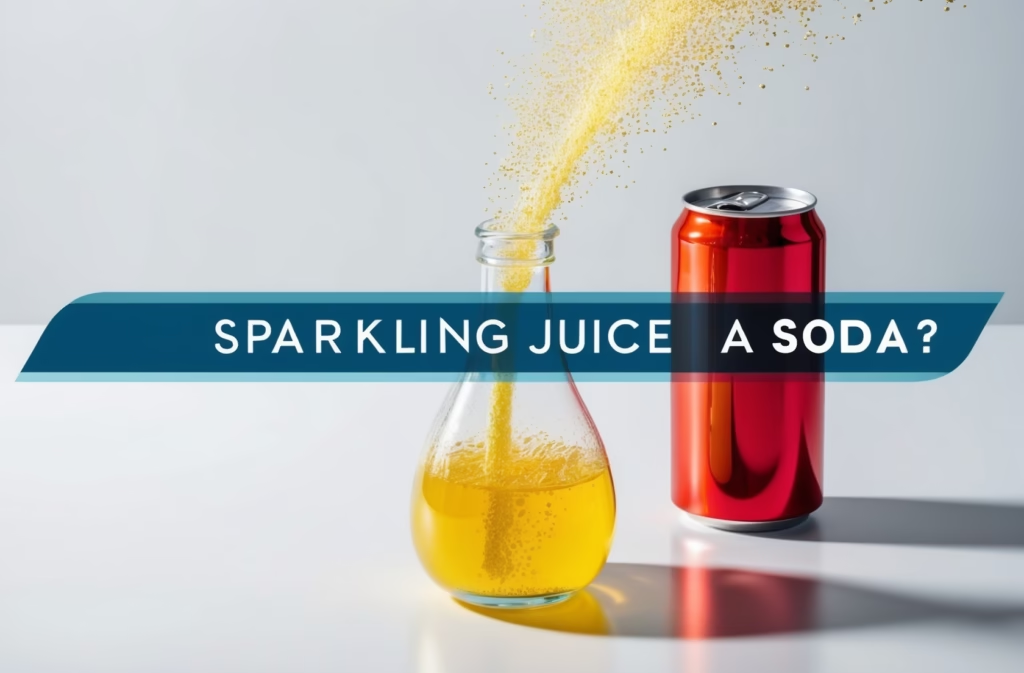Is Sparkling Juice a Soda? Uncover the truth about Sparkling Juice vs Soda. Learn if sparkling juice is a healthy alternative & make informed choices! Find out now!
Is Sparkling Juice a Soda? Unpacking the Fizz
The bubbly beverage aisle can be confusing. We see sparkling water, sparkling juice, and soda all vying for space. But are they all the same? This detailed guide dives deep into the question: Is sparkling juice a soda? We’ll compare sparkling juice vs soda, explore the health aspects of sparkling juice, and help you make informed choices about what you drink.
Understanding the Differences: Sparkling Juice vs Soda
The key to understanding the difference lies in the ingredients. Soda is primarily composed of carbonated water, high-fructose corn syrup or sugar, artificial flavorings, and sometimes artificial colors and preservatives. While some sodas might contain a small percentage of fruit juice, it’s often overshadowed by the added sugars and artificial components.
Sparkling juice, on the other hand, typically starts with real fruit juice. The sparkling element comes from added carbonation, but the core ingredient remains fruit juice. However, it’s crucial to read labels carefully, as some sparkling juices might contain added sugars or artificial sweeteners to enhance flavor or mask the natural sweetness of the fruit.
Consider the difference between a homemade sparkling juice – made simply by adding carbonation to freshly squeezed juice like our delicious pear kale juice – and a store-bought soda. The homemade version contains only fruit and carbonation, while the soda is a complex mixture of artificial ingredients.
Is Sparkling Juice Healthy? Examining the Nutritional Profile
The healthfulness of sparkling juice depends heavily on the ingredients. Naturally made sparkling juice, made from freshly squeezed peach mint juice for instance, retains many of the vitamins and minerals found in the original fruit. These can offer some nutritional benefits, including antioxidants and electrolytes. However, the added carbonation itself doesn’t provide nutritional value.
However, many commercially available sparkling juices include added sugars, which significantly impacts their health profile. Excess sugar consumption is linked to weight gain, type 2 diabetes, and other health problems. Therefore, choosing unsweetened sparkling juice or those with minimal added sugar is vital if you’re looking for a healthier alternative to soda. You can try making your own refreshing juice, like a green apple juice, and adding carbonation at home for ultimate control.
It’s also important to consider the acidity of the juice. The carbonation can increase the acidity, potentially leading to enamel erosion in teeth. Rinsing your mouth with plain water after consuming sparkling juice can mitigate this risk. For a zesty option, consider making your own cherry lime juice and sparkling it up.
Sparkling Juice vs. Soda: A Detailed Comparison
To further clarify the distinction between sparkling juice and soda, let’s look at a side-by-side comparison:
| Feature | Sparkling Juice | Soda |
|---|---|---|
| Primary Ingredient | Fruit Juice | Carbonated Water, Sugar/HFCS |
| Added Sugars | Varies (can be high in some brands) | Typically high |
| Artificial Ingredients | Varies (can be present in some brands) | Often contains artificial flavors, colors, and preservatives |
| Nutritional Value | Depends on the type and added sugar content; some vitamins and minerals may be present | Minimal nutritional value |
| Calories | Varies widely | Relatively high |
Making Informed Choices: Reading Labels Carefully
The key to making healthy beverage choices lies in careful label reading. Pay close attention to the ingredients list. Look for products with minimal added sugars and avoid those containing artificial sweeteners, flavors, or colors. A simple sparkling juice made with fresh mango and orange juice offers a much healthier profile than many commercially produced options.
The serving size is another important factor. Even if a sparkling juice is relatively healthy in terms of its ingredients, consuming large quantities can still lead to excess sugar intake. Stick to recommended serving sizes.
The Verdict: Is Sparkling Juice a Healthier Alternative to Soda?
The answer isn’t a simple yes or no. Some sparkling juices can be a healthier alternative to soda, particularly those made with minimal added sugars and real fruit juice. However, many commercially produced sparkling juices still contain significant amounts of added sugar, negating any potential health benefits. Therefore, choosing wisely and reading labels carefully is paramount.
To further your understanding, you may find this article helpful: Healthline’s article on Sparkling Water. This provides a comprehensive overview of the health effects of carbonated beverages.
For more in-depth information on the sugar content in beverages, check out this resource from the American Diabetes Association.
Beyond the Fizz: Exploring Healthier Alternatives
While sparkling juice can be a refreshing choice, there are even healthier options available. Plain water is always the best choice for hydration. Unsweetened sparkling water offers the fizz without the added sugar. You can also explore herbal teas or infused water for a flavorful and healthy alternative to both soda and sparkling juice.
Conclusion: Making the Right Choice for You
Ultimately, whether sparkling juice is a soda depends entirely on its ingredients. It’s not a simple yes or no answer. Understanding the difference between sparkling juice and soda, paying close attention to nutrition labels, and making informed choices are key to maintaining a healthy diet and lifestyle. By being a savvy consumer, you can enjoy the refreshing fizz while making choices that support your well-being.
Share Your Sparkling Juice Experiences!
We’d love to hear about your experiences with sparkling juices. Have you noticed a difference between various brands or types? Do you have any tips for choosing healthy options or making your own homemade sparkling juice? Share your thoughts and experiences in the comments below! Let’s discuss is sparkling juice a soda and more!

- Is sparkling juice a soda?
- Not exactly. While both are carbonated beverages, sparkling juice typically uses real fruit juice as its base, unlike soda, which is primarily made with sugar and artificial flavorings. The key difference lies in the ingredients. Consider the nutritional information when comparing Sparkling Juice vs Soda.
- What’s the difference between sparkling juice and soda?
- The primary difference between sparkling juice and soda is the source of sweetness and flavor. Sparkling juice uses real fruit juice, while soda uses sugar (often high-fructose corn syrup) and artificial flavorings. Sparkling juice may contain added sugar, but the primary source of sweetness is the fruit itself.
- Is sparkling juice healthier than soda?
- Generally, yes. Is Sparkling Juice Healthy? It often contains vitamins and antioxidants from the fruit juice. However, many sparkling juices also contain added sugar, so moderation is key. Compare the nutritional labels of different brands to make informed choices. Soda, on the other hand, offers little to no nutritional value.
- Does sparkling juice contain artificial sweeteners?
- Some sparkling juices do, while others use only natural sugars from the fruit. Always check the ingredient list to confirm. Look for brands that emphasize no artificial sweeteners if this is a concern for you.
- Is sparkling juice good for weight loss?
- It depends on the specific product and your overall diet. Some sparkling juices are lower in sugar than soda, but many still contain significant amounts of sugar which can hinder weight loss efforts. Choose low-sugar or no-sugar-added options if weight management is a goal.
- Can I give sparkling juice to children?
- Moderation is key. While potentially healthier than soda, the added sugar content in many sparkling juices can still contribute to dental problems and other health issues in children. Opt for unsweetened varieties or dilute them with water.
- Is all sparkling juice the same?
- No. There’s a wide variation in ingredients and sugar content among different brands and types of sparkling juice. Always read nutrition labels before purchasing to make informed decisions about Is Sparkling Juice Healthy for you.
- Does sparkling juice have caffeine?
- Typically, no. Unlike some sodas that contain caffeine, most sparkling juices do not. However, always check the ingredient list to be sure, as some specialty brands might contain added ingredients.
- What are the potential downsides of drinking sparkling juice?
- High sugar content is the main concern. Excessive sugar consumption can lead to weight gain, dental problems, and other health issues. The carbonation can also cause bloating or gas in some individuals.
- How can I choose a healthier sparkling juice?
- Look for options with lower sugar content, preferably those made with 100% fruit juice and no added sugars or artificial sweeteners. Compare the nutritional information of various Sparkling Juice vs Soda brands to make the best choice for your health goals.

Is Sparkling Juice a Soda? Unpacking the Fizz
The bubbly beverage aisle can be confusing. We often see sparkling juice alongside sodas, leaving many wondering: Is sparkling juice a soda? The answer isn’t a simple yes or no. Understanding the difference between sparkling juice vs soda requires a closer look at ingredients and nutritional content. This comprehensive guide will help you navigate this question, exploring the health implications and providing a delicious recipe to try.
What Makes Sparkling Juice Different from Soda?
The key difference lies in the primary ingredient. Sodas are typically carbonated water with added sugar, artificial sweeteners, flavors, and preservatives. Sparkling juice, on the other hand, starts with real fruit juice. The sparkle comes from added carbonation, but the base is fruit juice, not a sugary syrup. However, the line can blur. Some sparkling juices contain added sugars to enhance flavor, making the distinction less clear. Always check the ingredient list to be certain.
Is Sparkling Juice Healthy? A Nutritional Deep Dive
The healthiness of sparkling juice depends heavily on the ingredients. Naturally, a sparkling juice made with 100% fruit juice and no added sugars will be a healthier option compared to a soda. However, many commercially produced sparkling juices contain added sugars, which can negate some of the potential health benefits. This article from Healthline provides insightful information about the negative impacts of added sugar on health.
Consider the sugar content: while fruit naturally contains sugar (fructose), excessive added sugar significantly contributes to weight gain, type 2 diabetes, and other health problems. Compare the nutritional information of your favorite sparkling juice to that of a soda; you might be surprised by the similarities in sugar content if added sugars are present. For a truly healthy option, look for sparkling juices with minimal added sugar or those made with unsweetened juices, possibly even homemade!
To further illustrate the variety in fruit juices, let’s explore some options: For a refreshing green option, consider a green apple juice; for a tropical twist, try mango orange juice. If you are seeking a slightly tart option, cherry lime juice might be perfect. For a unique blend of flavors, check out our recipes for pear kale juice or peach mint juice.
Recipe: Sparkling Raspberry Lemonade
This recipe provides a delicious and relatively healthy alternative to store-bought sparkling juices, minimizing added sugars while maximizing flavor.
Ingredients:
- 4 cups fresh raspberries
- 1 cup filtered water
- 1/2 cup fresh lemon juice
- 1/4 cup honey or maple syrup (optional, adjust to taste)
- 4 cups chilled sparkling water
- Fresh raspberries and lemon slices for garnish
Instructions:
- Combine raspberries and water in a blender. Blend until smooth.
- Strain the raspberry mixture through a fine-mesh sieve to remove seeds (optional, but recommended for a smoother drink).
- In a large pitcher, combine the strained raspberry puree, lemon juice, and honey or maple syrup (if using). Stir well to combine.
- Carefully add the chilled sparkling water. Stir gently to incorporate.
- Taste and adjust sweetness as needed.
- Serve immediately over ice, garnished with fresh raspberries and lemon slices.
Nutrition Information (per serving, based on 4 servings)
Note: This nutritional information is an approximation and may vary based on the specific ingredients used. This calculation assumes the optional honey is used.
| Nutrient | Amount per Serving | % Daily Value (DV) |
|---|---|---|
| Calories | 150 | 7.5% |
| Protein | 1g | 2% |
| Total Fat | 0g | 0% |
| Saturated Fat | 0g | 0% |
| Unsaturated Fat | 0g | 0% |
| Trans Fat | 0g | 0% |
| Total Carbohydrate | 38g | 12.7% |
| Dietary Fiber | 2g | 8% |
| Total Sugars | 30g | – |
| Added Sugars | 15g (from honey) | – |
| Vitamin C | 20mg | 22% |
| Potassium | 150mg | 4% |
| Manganese | 0.2mg | 10% |
For more precise nutritional data, consider using a nutrition calculator with specific brand ingredients. MyFitnessPal is a great resource for tracking nutrition.
Summary of Nutritional Features
This Sparkling Raspberry Lemonade recipe offers a refreshing beverage with a moderate calorie count and a good source of Vitamin C and fiber. However, it’s important to note the added sugar from the honey; adjusting the amount or using a sugar substitute can help reduce this. Comparing this recipe to a typical soda reveals a significantly lower artificial ingredient and higher natural vitamin content.
Try it, Share it, Love it!
Ready to experience the delightful fizz of homemade sparkling juice? Give this recipe a try and let us know what you think in the comments below! Share your creations on social media using #SparklingJuiceRecipe #HomemadeFizz. Don’t forget to tag us! We can’t wait to see your sparkling creations!

Is Sparkling Juice Just Soda in Disguise?
The question of whether sparkling juice is essentially soda often sparks debate. While both are bubbly beverages, key differences exist. Sparkling juice, at its core, uses real fruit juice as its base. This contrasts with soda, which relies on artificial flavorings and high fructose corn syrup for its sweetness and fizz. However, the sparkling aspect introduces some complexities. The carbonation process itself doesn’t inherently make a beverage unhealthy, but it can impact sugar content and acidity.
Consider the sugar content. Even naturally sweetened juices like pear kale juice or peach mint juice can contain significant amounts of sugar when carbonated. The added bubbles might make you consume it faster and consume more sugar than you would with the non-carbonated version. Therefore, moderation is crucial. Choose sparkling juices with minimal added sugar, opting for varieties that highlight the natural sweetness of the fruit.
Acidity is another factor. Carbonation can increase the acidity of the juice, potentially irritating sensitive stomachs. Individuals with acid reflux or other digestive sensitivities should be mindful of their intake. This is particularly true if you are choosing something acidic like cherry lime juice. If you are concerned, consider diluting your sparkling juice with water.
Health benefits can still exist depending on the ingredients. Juices containing leafy greens like those found in pear kale juice offer nutritional advantages. However, relying solely on sparkling juice for vitamins and minerals is not recommended. A balanced diet containing whole fruits and vegetables remains essential for optimal health. The effervescence of mango orange juice or green apple juice, when sparkling, might be appealing, but don’t let the fun mask the importance of a well-rounded diet.
In conclusion, while sparkling juice isn’t identical to soda, it shares some similarities, especially concerning sugar content. Make informed choices by reading nutrition labels, choosing varieties with lower sugar, and being mindful of potential digestive sensitivities. Moderation is key to enjoying sparkling juice as part of a healthy lifestyle. Don’t let the bubbles fool you – prioritize whole fruits and vegetables for your overall well-being.